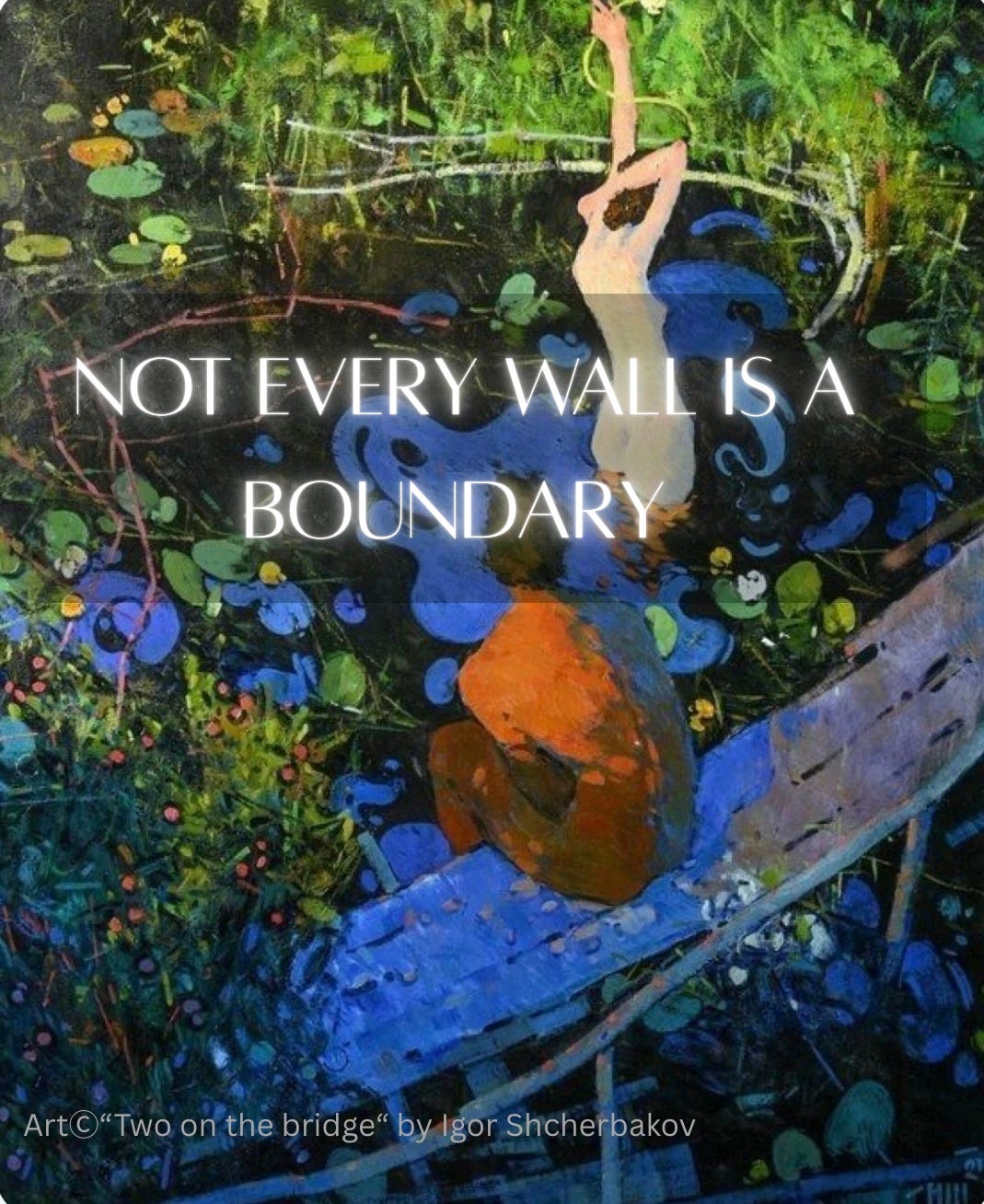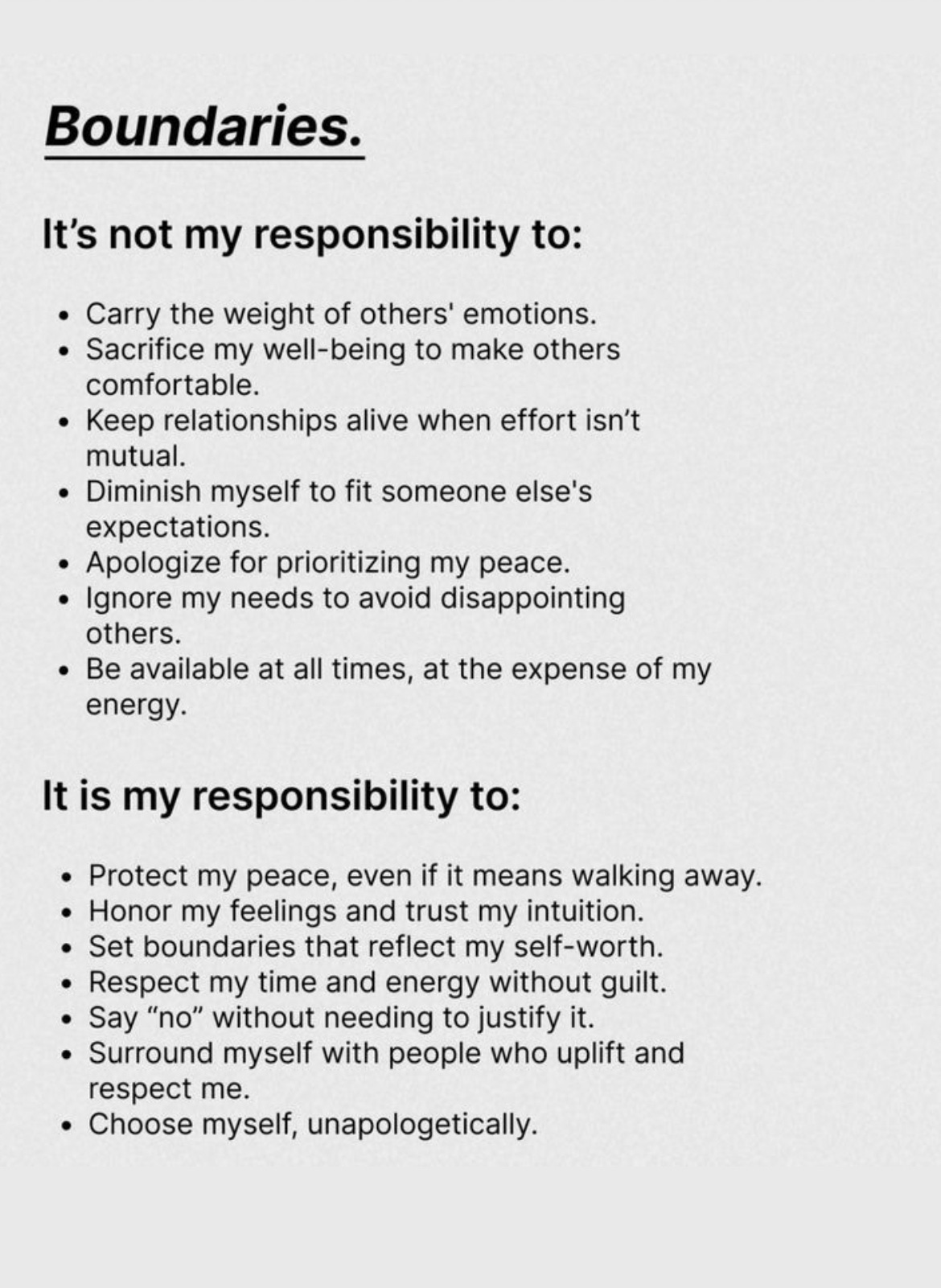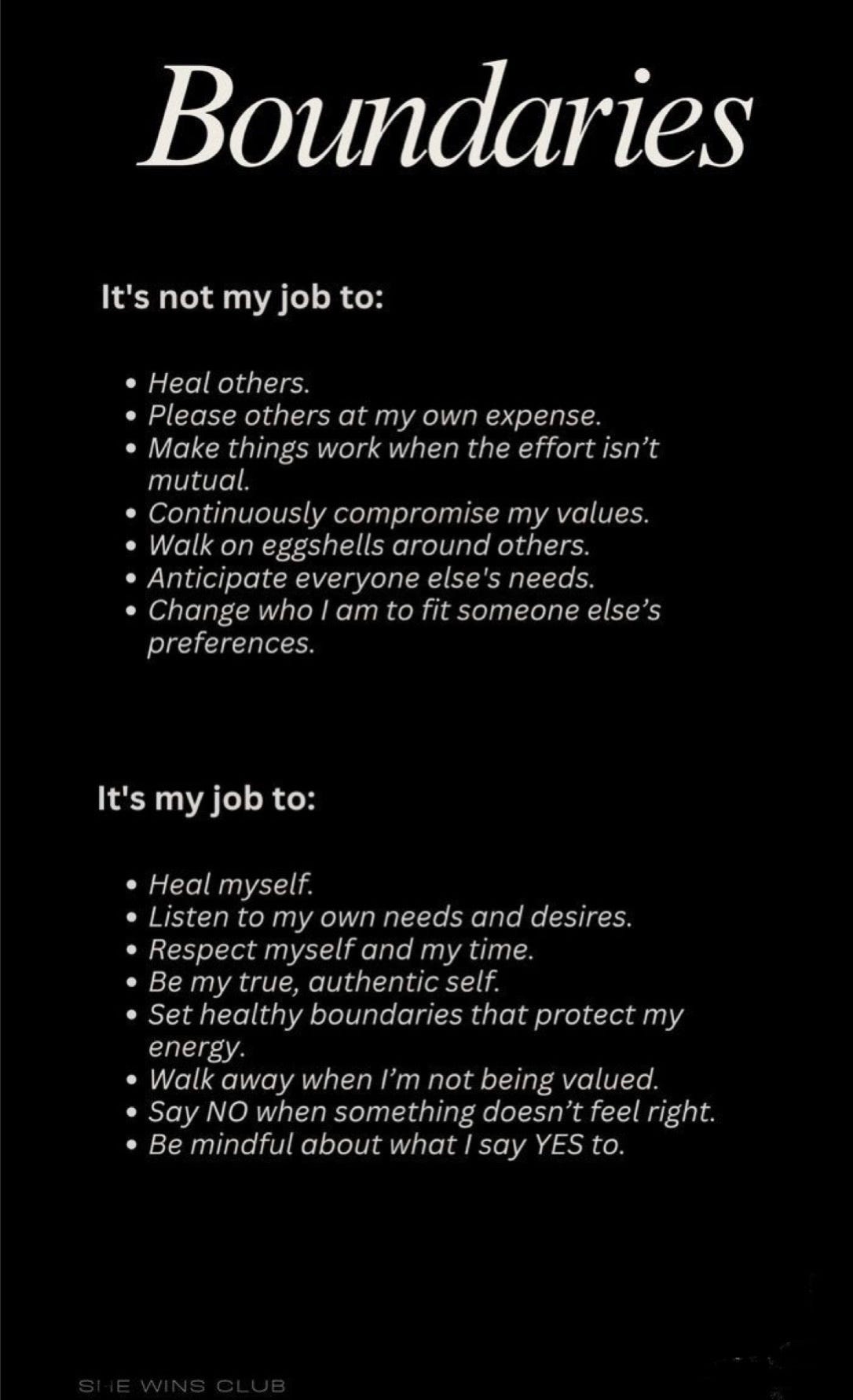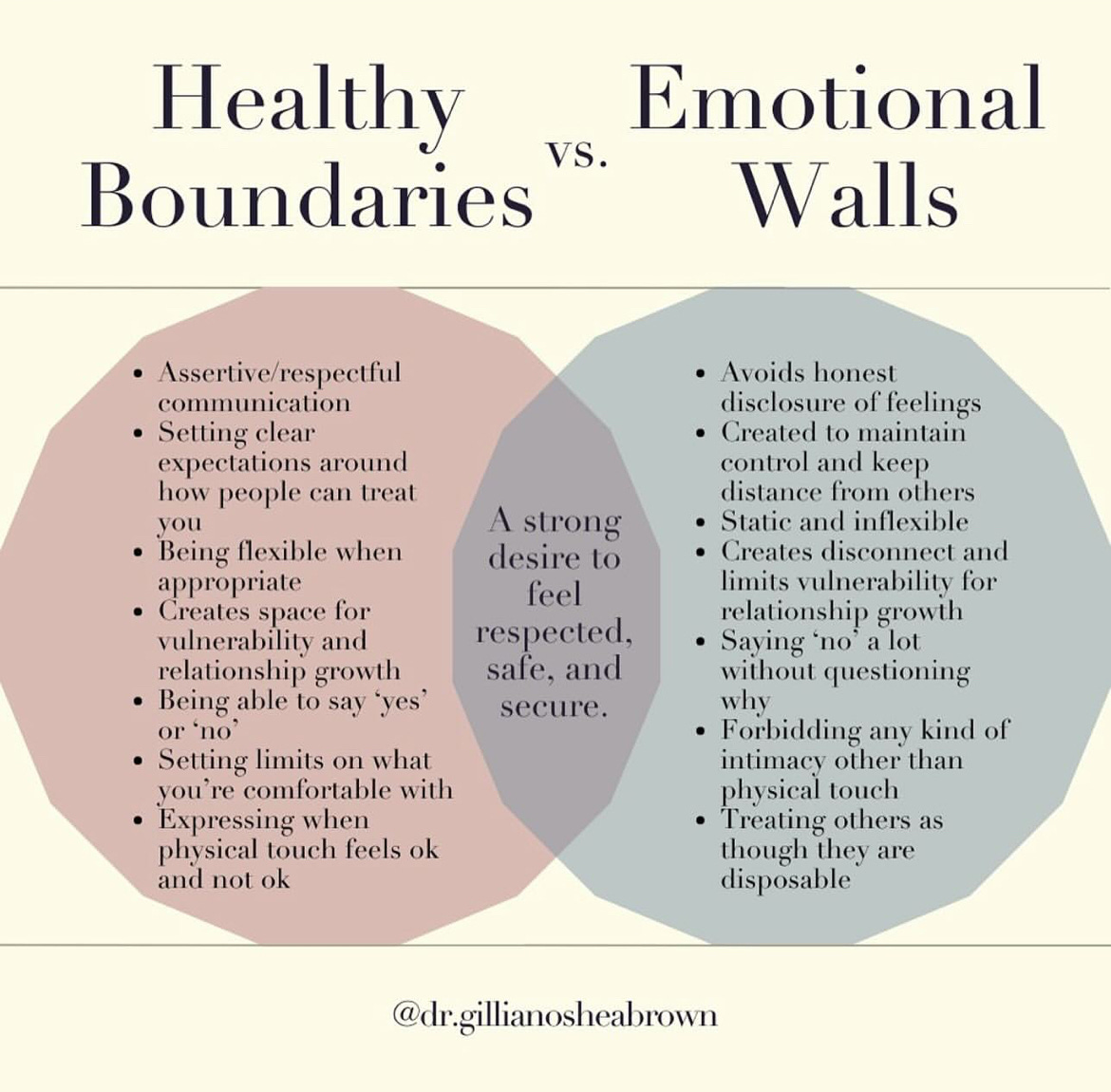Here’s the thing nobody really likes to say out loud: not every wall you build is holy. Some of what we call “boundaries” are just fear with a cloak.
Sometimes it’s paranoia we’ve rebranded as intuition, or resentment that got dressed up as “self-respect.” Other times it’s simply pain that never got metabolized, hiding under the word healing.
And honestly? In a lot of spiritual and self-help spaces, the word boundaries has become untouchable. It’s this shield people hold up, a badge of sovereignty. But more often than not, it’s just the ego sneaking around, using “boundaries” as a cloak for everything it doesn’t want to admit.
Instead of sitting with the wound, the ego spins a neat little story:
“they’re toxic, I’m sovereign, I’m protecting my energy.”
It sounds enlightened, but it’s just the same old drama rewritten in spiritual language. Jung - who’s practically a hashtag these days, quoted everywhere as shorthand for “doing the work” - would probably call this exactly what it is: shadow projection dressed up as individuation.
And this is where boundaries turn into weapons. They become a way of saying:
“My discomfort is your fault.”
Or:
You’re out of my life now because I’m evolved.
But really, what’s happening is unprocessed grief, paranoia, or just plain projection being shoved onto someone else.
1. When Boundaries Aren’t Boundaries
A real boundary has a different feel to it. It’s clean. It protects your life force. It opens up space, instead of locking everything down. But what we often see instead is more like:
Calling paranoia a boundary.
Using silence as a way to avoid, then pretending it’s strength.
Projecting bitterness onto someone and slapping the “toxic” label on them.
Choosing hostility, but hiding it under “self-respect.”
This is boundaries culture at its worst: the ego never gets questioned. The shadow stays safe in the dark. And the script sounds so righteous:
“I’m just protecting my energy.”
If we’re brutally honest, a lot of “boundaries” floating around in self-help circles are really just avoidance or grief that hasn’t been touched yet. A wall built from fear isn’t a boundary, it’s a cage.
2. When Memes Get It Wrong (and Right)
Much of what passes for “boundaries” online is little more than avoidance dressed in affirmations. Memes that declare “It’s not my job to heal you, I only choose myself” may sound empowering, but often carry an air of superiority.
They are more about self-righteous walls than genuine, life-giving boundaries. They erase empathy and leave no room for dialogue, making it easy for avoidant personalities or even narcissists to weaponise the language of boundaries as an excuse for detachment.
Here are two random example I found on Pinterest:
Note: I could not find the authors of these 2 slides. Please contact me if you know them. Thank you.
What’s the problem here? At first view, this type of slides often start from a healthy impulse (self-protection, clarity, empowerment). But stripped of nuance, they can be used in really toxic ways. A narcissist, for instance, could grab that script and flip it into a justification for their own avoidance or lack of accountability. For example:
“It’s not my job to heal others” → twisted into “I don’t need to care about your feelings.”
“It’s my job to heal myself” → spun into “Your needs don’t matter here, only mine.”
“I walk away when I’m not being valued” → rebranded as ghosting or stonewalling whenever they’re challenged.
Take away: The problem is the tone of absoluteness. Healthy boundaries don’t mean zero responsibility for others or self-centered detachment.
Real connection requires some mutual care, compromise, and even discomfort.
When “boundaries” are framed as “I’m above you, I don’t owe you anything, I’m just protecting my energy”, they slide into narcissistic logic. And yes, people with avoidant tendencies (or narcissists outright) will latch onto that to avoid accountability, empathy, or growth.
In contrast, healthy boundary work sounds more like:
“I need to respect my limits, and I want to be clear about them with you.”
“I can’t take responsibility for fixing you, but I care about how my actions affect you.”
“I need to step back here, but I’m willing to talk about what this means for us.”
It leaves space for empathy and honesty, which is exactly what’s missing in those “cut them off, protect your energy” memes.
Take away: True boundary work clarifies the terms of relationship so that both people can stand more authentically in their wholeness.
But not all boundary language online is misleading. Some versions actually honor the relational nature of limits. Take, for example, this comparison below:
Unlike the rigid, self-righteous tone of many slides, this framing reminds us that the core desire is the same: we all long to feel respected, safe, and secure.
The difference lies in how that desire is expressed. Emotional walls are static and controlling, shutting others out under the guise of protection. Healthy boundaries, on the other hand, involve assertive communication, flexibility, and space for mutual growth. They protect the self without erasing the possibility of intimacy.
Take away: This distinction between protection that fosters connection and avoidance that severs it is what much of “boundaries culture” forgets.
3. What about someone blocking you without explanation?
I’ve been there. The truth is that it’s not your fault. It has more to do with them than with you. When someone blocks you with no explanation and later calls it “boundaries,” what’s really happening is avoidance cloaked as healing. It’s not sovereignty, it’s fear with a halo. Several things are actually happening beneath the surface:
☆ Avoidance is being spiritualised.
They don’t want to face the discomfort of dialogue, so instead of saying “I’m hurt,” or “I need space,” they retreat into silence. Then, by calling it a boundary, they give themselves a moral shield: “I’m protecting my peace.”
☆ The other person is erased from the story.
True boundaries are relational: they clarify how I can stay in connection with you without losing myself. But ghosting, blocking, and disappearing without explanation deny the other person any opportunity for repair, dialogue, or closure. It’s not boundary, it’s unilateral severance.
☆ Projection gets disguised as sovereignty.
Jung would call this classic shadow work avoidance. Instead of asking “Why did this situation trigger me?”, the story becomes “They are toxic, I am sovereign.” The ego crowns itself enlightened, while the messy feelings (grief, resentment, fear) get pushed underground.
☆ It creates more fragmentation, not integration.
Cutting someone off without clarity leaves both people carrying unresolved weight. The one who blocked has to keep reinforcing the story that they were right, while the one who was cut off is left holding confusion or pain. No one grows.
4. Jung, the Shadow, and the Disguised Wall
Jung’s whole point was that whatever we refuse to deal with inside ourselves doesn’t vanish. It gets projected outwards. Hence, boundaries, when misused, make the perfect camouflage. Instead of pausing and asking:
“Okay, why is this stirring me so much?”
we just declare:
“They crossed my boundary.”
On the surface, it looks clean. In reality, it is anything but. What’s happening is the disowned part of us - the anger we never admitted, the grief we never touched, the mistrust we never integrated - gets projected onto someone else. They become “toxic,” “unsafe,” or “the problem,” while we get to preserve the illusion of clarity.
Take away: Projection masquerading as a boundary doesn’t just cut off the other person, it cuts us off from ourselves.
No real dialogue. No depth. Just distance. The ego stays untouchable, but the Self—the deeper source of wholeness—gets pushed further underground.
So maybe the better question is:
is this boundary an act of clarity, or is it just my shadow in disguise?
Here are a few shadow work prompts to help you ponder:
Where have I mistaken resentment or fear for a boundary?
What part of me do I exile when I choose avoidance instead of dialogue?
How does calling my paranoia a “boundary” help me feel righteous instead of real?
What would unravel if I admitted my “boundary” was actually grief or hostility?
And (on the flip side) where do I actually need a real boundary, one rooted in Self instead of shadow?
5. Closing
A true boundary feels clean, almost quiet. It gives life room to move. A wall built by the shadow is heavy, brittle, and full of static. From the outside, they might look the same but inside, the frequency is worlds apart.
So maybe before we sanctify every wall, we check in:
is this clarity, or is this fear with a halo on?
Because the truth is simple: not every wall is a boundary.
If you want to look deeper into this boundary work and its unhealed patterns, proceed to part 2 for paid subscribers.
I will add the link soon!








